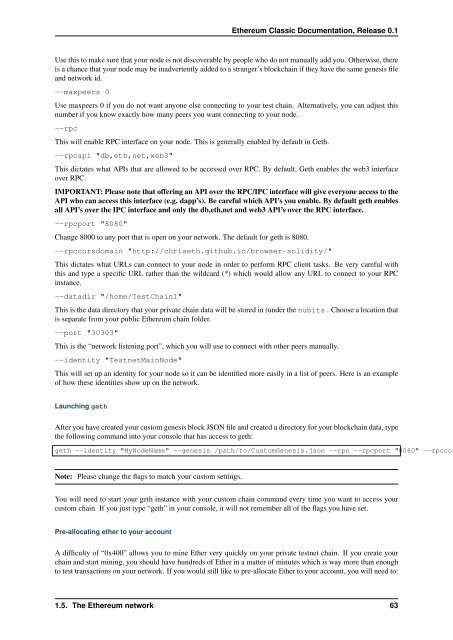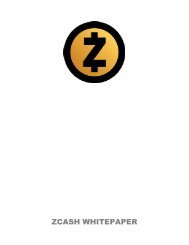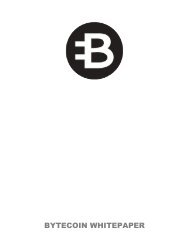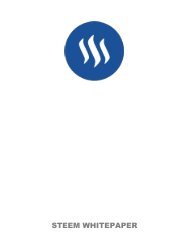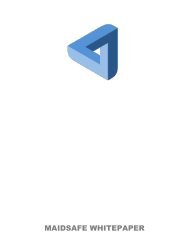Whitepaper - Ethereum Classic With Cover
You also want an ePaper? Increase the reach of your titles
YUMPU automatically turns print PDFs into web optimized ePapers that Google loves.
<strong>Ethereum</strong> <strong>Classic</strong> Documentation, Release 0.1<br />
Use this to make sure that your node is not discoverable by people who do not manually add you. Otherwise, there<br />
is a chance that your node may be inadvertently added to a stranger’s blockchain if they have the same genesis file<br />
and network id.<br />
--maxpeers 0<br />
Use maxpeers 0 if you do not want anyone else connecting to your test chain. Alternatively, you can adjust this<br />
number if you know exactly how many peers you want connecting to your node.<br />
--rpc<br />
This will enable RPC interface on your node. This is generally enabled by default in Geth.<br />
--rpcapi "db,eth,net,web3"<br />
This dictates what APIs that are allowed to be accessed over RPC. By default, Geth enables the web3 interface<br />
over RPC.<br />
IMPORTANT: Please note that offering an API over the RPC/IPC interface will give everyone access to the<br />
API who can access this interface (e.g. dapp’s). Be careful which API’s you enable. By default geth enables<br />
all API’s over the IPC interface and only the db,eth,net and web3 API’s over the RPC interface.<br />
--rpcport "8080"<br />
Change 8000 to any port that is open on your network. The default for geth is 8080.<br />
--rpccorsdomain "http://chriseth.github.io/browser-solidity/"<br />
This dictates what URLs can connect to your node in order to perform RPC client tasks. Be very careful with<br />
this and type a specific URL rather than the wildcard (*) which would allow any URL to connect to your RPC<br />
instance.<br />
--datadir "/home/TestChain1"<br />
This is the data directory that your private chain data will be stored in (under the nubits . Choose a location that<br />
is separate from your public <strong>Ethereum</strong> chain folder.<br />
--port "30303"<br />
This is the “network listening port”, which you will use to connect with other peers manually.<br />
--identity "TestnetMainNode"<br />
This will set up an identity for your node so it can be identified more easily in a list of peers. Here is an example<br />
of how these identities show up on the network.<br />
Launching geth<br />
After you have created your custom genesis block JSON file and created a directory for your blockchain data, type<br />
the following command into your console that has access to geth:<br />
geth --identity "MyNodeName" --genesis /path/to/CustomGenesis.json --rpc --rpcport "8080" --rpccor<br />
Note: Please change the flags to match your custom settings.<br />
You will need to start your geth instance with your custom chain command every time you want to access your<br />
custom chain. If you just type “geth” in your console, it will not remember all of the flags you have set.<br />
Pre-allocating ether to your account<br />
A difficulty of “0x400” allows you to mine Ether very quickly on your private testnet chain. If you create your<br />
chain and start mining, you should have hundreds of Ether in a matter of minutes which is way more than enough<br />
to test transactions on your network. If you would still like to pre-allocate Ether to your account, you will need to:<br />
1.5. The <strong>Ethereum</strong> network 63


